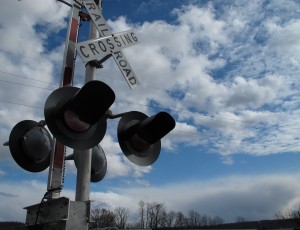The Clean Railroads Act: The Oil and Gas Industry Exemption You’ve Never Heard Of
-
Marie Cusick

Marie Cusick/StateImpact Pennsylvania
The Clean Railroads Act was meant to close a legal loophole and increase state and local oversight of polluted rail yards across the country, but it left open a smaller loophole for oil and gas waste.
The federal Clean Railroads Act of 2008 was meant to close a loophole in the law and increase state and local oversight of polluted rail yards across the country.
But it left open a smaller loophole for the oil and gas industry, according to Mark Szybist, an attorney for the environmental group PennFuture.
“This is not one of the big [exemptions],” he says, “But it’s one more example of the industry’s great clout on the federal level and how they establish for themselves a different set of rules.”
This different set of rules became clear to the people of Sunbury, Northumberland County.
In January 2011, trucks started rolling into town and loading drill cuttings onto trains at rail yard on an old industrial site, which is right next to a residential neighborhood.
Drill cuttings are waste dirt and rock that can contain chemicals and naturally occurring radioactive materials. Neighbors said the trucks would sometimes leak, and the drill cuttings smelled like oil and gas.
Sunbury residents complained to the state Department of Environmental Proctection (DEP). They were concerned because the facility didn’t have a permit.
The DEP spent over a year deciding, finally, that no permit was needed.
The agency cited the federal Clean Railroads Act of 2008 in a letter to Norfolk Southern, the railroad hauling the drill cuttings. The DEP insisted, however, the facility still had to comply with all Pennsylvania and federal laws.
But without a permit, it can be harder to enforce the law, says Szybist. Statutes and regulations are implemented through permits. There are reporting and monitoring requirements.
“How can we be sure it’s just drill cuttings?” he says, “There are all kinds of wastes that are generated at a well site.They didn’t have a permit, so they didn’t have to report what they were transporting.”
The Clean Railroads Act leaves oil and gas waste out of its definition of “industrial waste”:
The term ‘industrial waste’ means the solid waste generated by manufacturing and industrial and research and development processes and operations, including contaminated soil, nonhazardous oil spill cleanup waste and dry nonhazardous pesticides and chemical waste, but does not include hazardous waste regulated under subtitle C of the Solid Waste Disposal Act (42 U.S.C. 6921 et seq.), mining or oil and gas waste [emphasis added].
“I think a lot of people who follow oil and gas development activities are familiar with the exemptions under the Clean Water Act, and under the Safe Drinking Water Act for disclosure of hydraulic fracturing additives,” says Szybist, “There are a lot of exemptions that this industry enjoys from major environmental statutes.”
The DEP declined repeated requests by StateImpact to discuss the gas drilling waste in Sunbury, but a spokesman for the agency says there are no violations at the rail yard and it complies with the law.
However, a vocal group of people say the site is currently in violation of city codes.
The drill cuttings stopped coming through town last year, but many residents believe that’s due to the overall slowdown in gas drilling.
You can read the DEP’s March 2012 letter to Norfolk Southern (which also declined to comment), citing the Clean Railroads Act as the reason the facility in Sunbury didn’t need a permit.
















